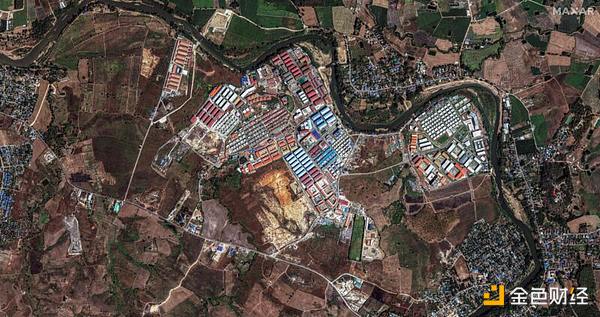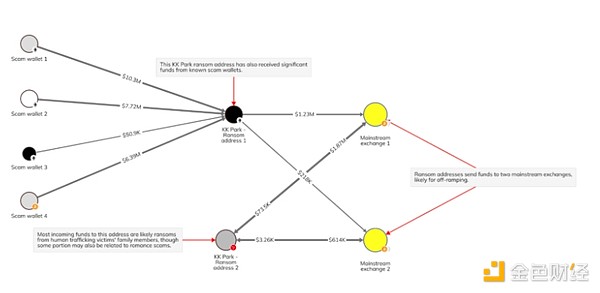Source: Chainalysis; Compiled by: Deng Tong, Golden Finance
Romance scams, also known as "pig-killing scams" because bad actors claim they "fatten" their victims to maximize their profits Possible value is a significant and growing issue with cryptocurrencies. Scammers first develop a relationship with their victims over a period of time, often initiating contact by pretending to text a wrong number or via a dating app. As the relationship deepens, the scammer will eventually push the victim to invest funds (sometimes in cryptocurrency, sometimes in fiat currency) in fake investment opportunities and continue to do so until the connection is eventually severed.

FBI 2022 IC3 The report states that Americans will lose more than $700 million to cryptocurrency and fiat currency butchery scams in 2022< /strong> Nearly $2.5 billion has been lost to crypto investment scams of any kind, regardless of whether there is a pig-killing element or not. These figures do not take into account victims in other countries, such as China, whose residents are also heavily targeted by these programs.
But while many are aware of the havoc wreaking havoc on victims, there is now also growing awareness of the scammers themselves – those on the other end of unsolicited text messages People - were exploited. As we discussed with journalist Alastair McCready on our 2022 Chainalysis Public Key podcast, and as the New York Times recently reported, individuals across China and Southeast Asia are being kidnapped, trafficked, and forced to work in large compounds. Cities such as Myawaddy in Myanmar are hotspots for this type of activity, as political instability there allows pig-killing gangs to operate with impunity.
In KK Park: Myanmar’s most notorious pig killing plate gathering place
We spoke with Eric Heintz, global analyst at the International Justice Mission Global Fusion Center. There, Heinz and his team assisted IJM's field office in helping trafficked victims by the butcher pan gang. As part of this work, they also track the gangs themselves, monitor their recruitment activities on social media, map their camps through satellite imagery, and communicate with victims.
“The working conditions these people face are horrific,” he told us. "They are forced to work 12 hours or more every day and if quotas for contacting potential fraud victims are not met, the gang beats them, tortures them and even withholds food."
Heinz also tells us more. Typically, one company owns the land and buildings and then leases them to other companies who carry out the actual butchery scam. Compound owners also often provide their tenants with "security," guards who prevent trafficking victims from escaping, Heinz said.
How do companies in these parks use cryptocurrencies? Of course, we knowthat they receive cryptocurrency payments from scam victims. But Heinz also told us that Pig gangs often tell families of trafficked workers to report They pay ransoms in exchange for their families' freedom - payments that are also often made in cryptocurrency. Heinz sent us the ransom address provided to him by trafficking victims and their families, which is linked to a fraud ring in KK Park, one of the most famous compounds in Southeast Asia. "Some scams may mix proceeds from the scam with ransoms paid by the victim's family," Heinz said. In fact, in addition to activity that may be related to ransom payments, the address he provided also appears to be associated with pig-killing trays. On-chain links to fraud-related addresses.

Satellite image of KK Park ©2023 Maxar Technologies
First, before we dive into on-chain analysis, Get some background information on KK Park. KK Park is home to one of the largest and most notorious pig-killing plate scams today. According to reports, KK Park is located in Myawaddy, a small town in Myanmar. It is reported that more than 2,000 trafficked persons are imprisoned. Pig killing plate scam scammer. According to Heintz, two of the ransom addresses provided to us by Heintz are associated with a company belonging to a butcher pan ring operating out of KK Park. The Chainalysis Reactor graph below shows on-chain activity for some addresses.

Only via Hein With the two ransom addresses provided to us by Ci, we were able to gain insight into the multi-million dollar activity associated with this prolific butchery gang. First, we see that while these addresses were provided to victims' families as ransom payments, the pair also received significant amounts of money from a number of known fraudulent addresses. For example, ransom address 1 has received approximately $24.2 million in cryptocurrency from the four scam-related wallets to its left. Both ransom addresses send and receive large amounts to major exchanges – some of the incoming transactions may be ransoms. Overall, the two addresses have received nearly $100 million in crypto inflows since becoming active in July 2022, although it’s unclear how much of that came from scams and extortion. Given that these are just two addresses for one company operating out of KK Park, we can infer that, overall, the butchery scammers working at the park are making a lot of money.
Our on-chain analysis shows how closely intertwined the pig-killing gang's ransom activities are with their main business - pig-killing scams. The cruel conditions faced by the perpetrators of pig-killing plate fraud in the compound also make it more urgent to solve the problem of pig-killing plate fraud-not only Victims are defrauded of hundreds of millions of dollars each year, and the gangs behind these scams are perpetuating a humanitarian crisis. The good news is that the cryptocurrency ecosystem is taking action: In November, stablecoin issuer Tether and cryptocurrency exchange OKX announced that they were working with the U.S. Department of Justice on an investigation that resulted in the freeze of Tether Approximately $225 million in USDT tokens were linked to an international human trafficking ring in Southeast Asia responsible for carrying out the pig-killing plate scam, with Chainalysis solutions helping in part. Additionally, in a South Korean-led Interpol operation in late 2023, authorities arrested 3,500 cybercriminals in connection with online fraud and seized $300 million in funds, $100 million of which were digital assets. We encourage all cryptocurrency businesses to look for any possible risks that they may be engaging in this activity and to report as much information as possible to law enforcement.
 JinseFinance
JinseFinance
 JinseFinance
JinseFinance JinseFinance
JinseFinance JinseFinance
JinseFinance Coindesk
Coindesk Beincrypto
Beincrypto Bitcoinist
Bitcoinist Beincrypto
Beincrypto Bitcoinist
Bitcoinist
 Bitcoinist
Bitcoinist